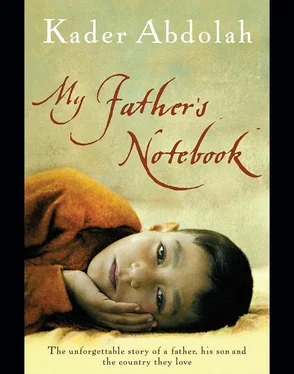“So, that’s your son?” she signed. “Allah, Allah, who could have imagined that Aga Akbar would have such a fine son?”
She planted a kiss on Ishmael’s forehead.
“Welcome, my boy. We never had children, so you’re like a son. Welcome to our humble abode. Make yourself at home. We’re friends of your father. Go on into the living room and sit down on that rug over there.”
A while later the farmer’s wife came in with a big brass tray of food on her head.
They ate and talked about the past. Ishmael didn’t need to interpret, since the three adults all understood each other. Then it was time for Ishmael to ask the farmer about his father’s story.
“Haven’t you heard that one before, my boy? Oh, of course not, how could you if I never told it to you?”
Aga Akbar kept his eyes on the farmer’s mouth and followed every word of the story, as if he could actually hear it being told. “Do you know who Reza Khan is?” the farmer began. “Reza Shah? Have you ever heard of him? Or read anything about him?”
“Of course. There’s a picture of him in our schoolbook. A man in a military tunic with a field marshal’s baton under his arm.”
“That’s the one! Allah, today’s children. They know everything! Yes, he was the father of our present shah. Before Reza Khan, we didn’t have compulsory military service. When he became shah, he ordered all young men to serve in the military for two years. But we didn’t want to go. Who would work the soil and plough the fields and mow the hay? After two years, we wouldn’t have a farm to come home to. So, whenever we saw a gendarme, we ran and hid on a roof or in a haystack.
“Sometimes, though, dozens of gendarmes swept down on the village and seized all the young men.
“Can you believe that, my boy? They just grabbed you, pushed you into a truck and took you away. And two years went by before you saw your family again. He was hard as nails, that Reza Shah.”
“Did you get picked up by the gendarmes?”
“Yes, they found me and beat me up. One day a truck pulled into the village and gendarmes hopped out. The young men made a run for it, scattering in all directions. They hid up on the roofs, down in the wells, up in the trees, you name it. Soon there wasn’t a single young man to be seen in the entire village. The gendarmes started shooting in the air. Just then your father rode into the town square on his horse, on his way to a customer.”
“Where were you? I thought you said you were hiding.”
“Clever boy! You’re a good listener. I was lying on the roof of the mosque and watching the whole thing from there.”
Aga Akbar laughed.
“Do you remember?” the farmer signed to him. “Akbar, do you remember when the gendarmes starting shooting in the air and … no, of course not, you couldn’t hear the shots.”
“No, I didn’t hear the shots,” Aga Akbar signed to Ishmael.
“Anyway, he rode into the square, sitting straight and tall in the saddle. Then he noticed a couple of gendarmes with rifles. He stopped and looked at them for a moment, then calmly rode on. ‘Stop!’ yelled one of the gendarmes. But Akbar didn’t hear him. ‘Stop, I said!’ There was no one in the square to tell the gendarme that Aga Akbar was a deaf-mute. ‘Stop!’ the gendarme yelled for the third time. ‘Stop, or I’ll shoot.’ Allah, what a moment. I lay on the roof and watched.”
“Then what happened?”
“Well, I had a tough decision to make. Actually, it wasn’t all that tough. All I had to do was stand up and say, ‘Stop! Don’t shoot.’”
“And did you?”
“Of course I did. I stood up then and there, put my hands in the air and shouted, ‘He’s deaf! Don’t shoot, he’s deaf!’”
“And then?”
“The gendarme pointed his gun at me and yelled, ‘Get down here!’”
“And my father?”
“He hadn’t heard a thing. He didn’t realise what was happening, so he just went on.”
“Now the gendarme was after me. ‘Jump!’ he yelled. And I had to jump down from that high roof. Did you happen to notice the mosque in our town square?”
“No, we didn’t come through your village.”
“Well, it has a high roof. I jumped from it. The heel of my right foot still acts up from time to time. Anyway, the gendarmes tied my hands together with a rope and shoved me into the truck. Then they went after your father. They didn’t believe he was a deaf-mute.”
“Why not?”
“They just didn’t. Your father was sitting up so straight and tall in the saddle and riding with such self-confidence that they had a hard time believing he couldn’t hear or talk.”
“And so they arrested him?”
“Yes. They grabbed the horse’s reins and beat your father up. Then they tied his hands behind his back and threw him into the truck next to me. And that’s how I wound up spending two years in the military.”
“And my father?”
“It’s a long story. Let’s have some tea first.”
The farmer’s wife came in with a cup of tea for Aga Akbar and her husband, and some hot cinnamon rolls for Ishmael.
“Haven’t you heard this story before?” she asked.
“Not really. My father’s tried to tell it to me many times, but I had no idea it went like this.”
“I must have heard it a hundred times. Your father used to visit us often, and the moment those two men sat down, they started in again on the gendarmes and the military service.”
The farmer drank his tea and continued his story.
“I swore up and down that Akbar was a deaf-mute. But the gendarmes wouldn’t listen. They took us to the army barracks in the city. The thing was, all kinds of people were trying to avoid the draft by pretending to be deaf and dumb, or blind. Some of the draftees even chopped off their forefingers so they couldn’t shoot a rifle. The gendarmes thought your father was faking it, so they locked him up.”
“In a prison cell?”
“Yes.”
“What’d my father do?”
“I don’t know. He probably didn’t have the faintest idea what was happening.”
“Why not? He must have been able to work it out. Didn’t he know what military service was?”
“I don’t think so. I wasn’t really sure myself. The whole idea scared me, it scared us all. The girls in the village wept when we left. They thought we’d never come back.”
“Why’d they put him in a cell?”
“They always locked up the men pretending to be deafmutes. They didn’t give them anything to eat or drink. After a while the men opened their mouths and begged, ‘Water, water! Please, I’m thirsty! Can you hear me? I’m not a deafmute. Water, please!’
“I was afraid that Akbar would get dehydrated. I had to do something.”
“Couldn’t you have reported it to the general or one of the officers?” Ishmael asked.
“No, they wouldn’t talk to the likes of me. Besides, I wouldn’t have dared. I’d never lived anywhere but in our village. I’d never been to the city before. I’d never even seen an officer or a general.
“Then things went from bad to worse. They found a book, a strange little book, in the pocket of your father’s coat.”
“What kind of book?” Ishmael asked.
“How would I know? I didn’t even know your father had a book. Anyway, the gendarmes got together to discuss it: What is it? How did this man get hold of a book written in cuneiform?
“Things were looking bad. I was called into the office. The chief gendarme asked me, ‘Do you know anything about this book?’
“‘Me? No.’
“I looked at it. I didn’t know how to read, but I flipped through it and saw that it wasn’t an ordinary book. It was written in a funny kind of writing. Hundreds of little wedges and spikes that looked like they’d been drawn by a child.
Читать дальше












